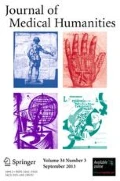Abstract
Cultural forces such as film create and reinforce rigidly-defined images of a doctor's identity for both the public and for medical students. The authoritarian and hierarchical institution of medical school also encourages students to adopt rigidly-defined professional identities. This restrictive identity helps to perpetuate the power of the patriarchy, limits uniqueness, squelches inquisitiveness, and damages one's self-confidence. This paper explores the construction of a physician's identity using cultural theorists' psychoanalytic analyses of gender and race as a framework of analysis. Cultural theorists' politically-motivated work provides an excellent point of departure for destabilizing parts of the authoritarian medical hierarchy that can damage a student's professional development. Drawing on such discourse, this paper examines the processes by which a doctor's identity becomes rigidly defined and fixed by daily training. It finally proposes a way for a medical student to extrapolate himself from the current definitions of this identity and create a broader, more malleable concept of professional identity by defining himself from outside of, rather than through, difference.
Similar content being viewed by others
REFERENCES
Althusser, L. (1971). Ideology and ideological state apparatuses (Notes towards an investigation). In Lenin and philosophy and other essays (pp. 121–173). New York: Monthly Review.
Butler, J. (1993). Bodies that matter: On the discursive limits of “sex.” New York: Routledge.
Butler, J. (1997). The psychic life of power: Theories in subjection. Stanford, CA: Stanford University Press.
Chodorow, N. (1989). Feminism and psychoanalytic theory. New Haven, CT: Yale University Press.
Fanon, F. (1967). Black skin white masks. (C. L. Makmann, Trans.). New York: Grove Press. (Original work published in1952).
Fiske, J. (1998). Culture, ideology, interpellation. In J. Revkin, & M. Ryan (Eds.), Literary theory: An anthology (pp. 305–311). Malden, MA: Blackwell.
Greger, M. (1999). Heart failure: Diary of a third year medical student. Self-published manuscript.
Grossberg, L., Nelson, C., & Treichler, P. (Eds.). (1992). Cultural studies. New York: Routledge.
Haines, R. (Director). (1991). The Doctor [Motion picture]. United States: Disney Studios.
Hall, S. (1996a). The after-life of Frantz Fanon. In A. Read (Ed.), The fact of blackness: Frantz Fanon and visual representation (pp. 12–37). Seattle, WA: Bay Press.
Hall, S. (1996b). Questions of cultural identity. London: Sage Publications.
Konner, M. (1987). Becoming a doctor: A journey of initiation in medical school. New York: Penguin Books.
Mercer, K. (1999). Busy in the ruins of a wretched phantasia. In A. Alessandrini (Ed.), Frantz Fanon: Critical Perspectives (pp. 11). New York: Routledge.
Mulvey, L. (1990). Visual pleasure and narrative cinema. In P. Erens (Ed.), Issues in feminist film criticism (pp. 28–40). Bloomington, IN: Indiana University Press.
Author information
Authors and Affiliations
Corresponding author
Rights and permissions
About this article
Cite this article
Kaiser, R. Fixing Identity by Denying Uniqueness: An Analysis of Professional Identity in Medicine. Journal of Medical Humanities 23, 95–105 (2002). https://doi.org/10.1023/A:1014821614175
Issue Date:
DOI: https://doi.org/10.1023/A:1014821614175



